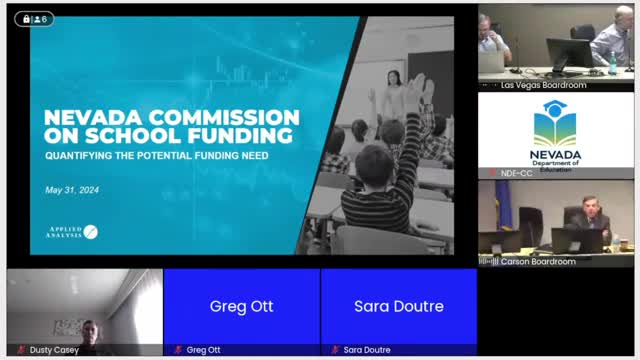State leaders push for bold education funding reforms
June 01, 2024 | Department of Education, Executive Agencies, Organizations, Executive, Nevada

This article was created by AI summarizing key points discussed. AI makes mistakes, so for full details and context, please refer to the video of the full meeting. Please report any errors so we can fix them. Report an error »

In a recent government meeting, officials discussed critical funding strategies for K-12 education, emphasizing the need to explore existing resources before considering tax increases. One key proposal highlighted was the potential reallocation of local government tax revenues, suggesting that some local governments have seen greater financial growth compared to school districts over the past decade. This reallocation could help balance the funding disparities among cities, counties, and school districts.
Another significant point raised was the declining share of the state's general fund allocated to K-12 education, which has dropped from 40% to 33% over the last 15 years. Participants argued that restoring this funding share could generate hundreds of millions of dollars for education without raising taxes, aligning with the state's priority to enhance K-12 funding.
Commission members expressed a strong desire for modernization of the state's fiscal policies, noting that the current systems have not been significantly reevaluated in over 50 years. They emphasized the importance of adapting funding mechanisms to meet the needs of a modern workforce and educational system, particularly in light of recent changes brought about by the pandemic and advancements in technology.
Concerns were also raised about the implications of raising taxes amid unprecedented inflation, with some members advocating for a careful approach to ensure that any new funding strategies are well-planned and targeted effectively. The meeting concluded with a commitment to further analyze these proposals and their potential impacts on the state's educational funding landscape.
Another significant point raised was the declining share of the state's general fund allocated to K-12 education, which has dropped from 40% to 33% over the last 15 years. Participants argued that restoring this funding share could generate hundreds of millions of dollars for education without raising taxes, aligning with the state's priority to enhance K-12 funding.
Commission members expressed a strong desire for modernization of the state's fiscal policies, noting that the current systems have not been significantly reevaluated in over 50 years. They emphasized the importance of adapting funding mechanisms to meet the needs of a modern workforce and educational system, particularly in light of recent changes brought about by the pandemic and advancements in technology.
Concerns were also raised about the implications of raising taxes amid unprecedented inflation, with some members advocating for a careful approach to ensure that any new funding strategies are well-planned and targeted effectively. The meeting concluded with a commitment to further analyze these proposals and their potential impacts on the state's educational funding landscape.
View full meeting
This article is based on a recent meeting—watch the full video and explore the complete transcript for deeper insights into the discussion.
View full meeting